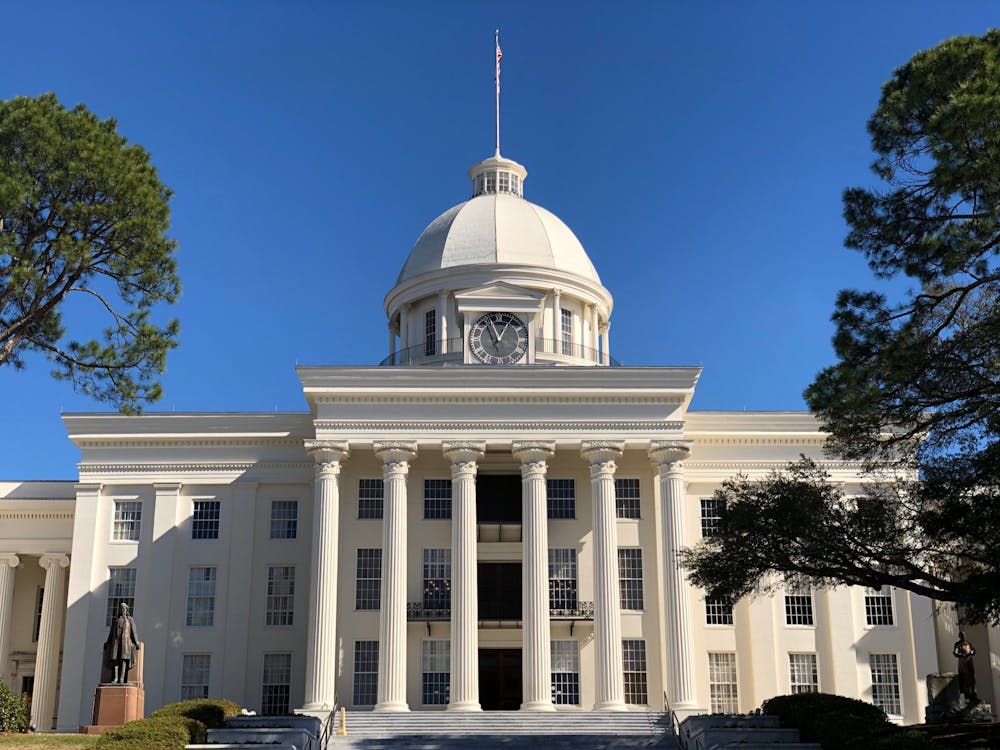Alabama Sen. Cam Ward, R-Alabaster, said he has proposed legislation that would deny bail to those accused of seven “very top crimes.”
Ward plans to file the bill when the state legislature convenes for its regular session starting next month. The bill would restrict pretrial release on bail in the following cases: murder, rape in the first degree, first-degree sodomy, sexual abuse, sexual torture, human trafficking and kidnapping.
Ward said he was inspired to file the bill following the kidnapping and killing of 19-year-old Aniah Blanchard, who was a student at Southern Union State Community College.
“You look at the Aniah Blanchard case, and that guy should have never been out on bail,” Ward said. “He just shouldn’t have been.”
At the time of Blanchard’s abduction, Ibraheem Yazeed, the alleged kidnapper and killer of Blanchard, was out on $295,000 bond on charges for several crimes, including kidnapping — a crime for which bail would be denied under Ward’s bill.
Ward said he was similarly motivated to propose this bill following the kidnapping and killing of 3-year-old Kamille “Cupcake” McKinney, from Birmingham.
“Same deal, [the suspect] had been arrested on felony kidnapping, was let go immediately, and, what’d [the suspect] do? [Suspect] goes and takes this little girl and kills her,” Ward said. “Those two, I think … really opened a lot of folks’ eyes.”
Patrick Stallworth and Derick Brown are both charged with capital murder and the kidnapping of McKinney but have not yet had a jury trial.
At the time of McKinney’s disappearance, Brown was out on bond for three felony kidnapping charges related to an incident in 2018.
Ward said the goal of this bill is to promote public safety by restricting release before trial for those accused of a wider range of crimes.
“You’re trying to protect society,” Ward said. “That’s your ultimate goal.”
Ward said other senators had even suggested denying bail to those accused of all violent crimes.
“Some folks would say all violent crimes, but violent crimes under our code can mean anywhere up to 35 different crimes,” Ward said. He considers his list of the top seven crimes narrow.
Other Alabama senators see other potential benefits to the proposed legislation.
“It’s also gonna make it easier for people who are possibly testifying to go on and testify without fear of any retribution,” said Sen. Tom Whatley, R-Auburn, who plans to co-sponsor the legislation when it’s filed. “I appreciate Sen. Ward for taking up this opportunity.”
Some advocacy groups, however, find widespread denial of bail has troubling implications.
“What’s at stake here is someone’s pretrial liberty,” said Micah West, senior staff attorney for the Southern Poverty Law Center. “Individuals who have been arrested, they haven’t been convicted of a crime. They are presumed innocent. They may be found innocent later.”
West said it’s important a person’s liberty isn’t taken.
“We want to ensure we aren’t taking away that person’s liberty if they haven’t been convicted and they haven’t had their day in court yet,” West said.
Under current Alabama statutes, those charged with non-capital offenses have a right to bail unless a judge determines the defendant poses a flight risk or danger to others or society at large, according to Alabama’s Rules of Criminal Procedure.
The Supreme Court has recognized the government’s ability to deny bail in these cases as legitimate.
However, bail is typically denied in Alabama only for capital offenses. The Supreme Court has recognized the rights of state and local courts to deny bail for those accused of capital crimes, stating that the Excessive Bail Clause from the Eighth Amendment to the U.S. Constitution does not apply in those cases.
“[The Excessive Bail] Clause, of course, says nothing about whether bail shall be available at all,” Chief Justice Rehnquist wrote in United States v. Salerno.
In these capital cases, there is still a burden on the judge to show that “the proof is evident or the presumption great” that the suspect committed the crime, according to Section 16 of the Alabama Constitution, which also protects the accused from excessive bail. Bail is provided as a default in these cases.
In Ward’s bill, for those accused of the seven crimes listed above, bail denial would be the default rather than the exception.
Because of this, Ward’s legislation would have to take the form of a Constitutional amendment, overriding at least part of Section 16 of the Alabama Constitution.
This change to the Constitution would apply only to certain cases, Ward claims. For crimes besides the top seven outlined in the legislation, Ward said Section 16 would still apply.
While the Supreme Court has generally allowed states to deny bail for defendants who are accused of capital offenses, assumed to be flight risks or thought dangers to society — considered individualized determinations — the Court has, in the past, been less inclined to allow a “categorical” denial of bail.
A categorical denial of bail could perhaps be best understood in the context of a pair of Arizona court rulings:
In 2018, the Arizona Supreme Court ruled that a 2002 Arizona law that denied bail for all those accused of sexual assault, sexual conduct with a minor under 15 years of age or molestation of a child under 15 was unconstitutional and denied the defendants their due-process rights. These defendants all belonged to a specific category, and it was their belonging to this category that resulted in their loss of bail.
In January of 2019, the U.S. Supreme Court refused to hear the case, letting the ruling stand.
In 2014, the 9th U.S. Circuit Court ruled in Lopez-Valenzuela v. Maricopa County that a 2006 Arizona law, that categorically denied bail to undocumented residents if they are accused of “serious felony offenses,” was unconstitutional.
“Whether a categorical denial of bail for noncapital [sic] offenses could ever withstand heightened scrutiny is an open question,” the U.S. Ninth Circuit Court wrote.
Ward recognized his legislation’s similarity to Arizona’s — the Constitutional amendment would, in essence, be a categorical denial of bail. Ward said he feels that allowing a case-by-case denial and not a categorical denial is contradictory.
“Right now, a judge actually has the discretion to deny bail anyway,” Ward said. “So in that case, it’d be hard to say, ‘Well this is denying someone their day in court or their Constitutional rights,’ but you have a judge who voluntarily denies it. How is that any different? They’re still being denied.”
To the SPLC, this distinction is fundamental, and it rests on cornerstone American principles.
“It all comes down to fundamental public policy positions that are based on those principles of supporting longstanding jurisprudence of American law that says, ‘Innocent until proven guilty,’” said Shay Farley, state policy director for the organization. “And if the state is going to deny liberty, they have to have a heavy burden to meet.”
Ward said he met with officials on Monday, Jan. 27, to discuss how to avoid the outcomes similar legislation has met.
“One of the things they say you have to change — in order to make sure that you don’t fall into the same Constitutional traps that other states have made — is you need to have a backstop,” Ward said. “There has to be, at some point, at least some opportunity for judicial override, and there has to be an expedited hearing in those cases.”
Judicial override would allow judges to make exceptions to the categorical denial of bail.
“You have to basically show that you have no doubt this person is not going to be a threat to society,” Ward said, describing the role of the judge in carrying out a judicial override.
Ward said the goal of having an expedited hearing is to avoid inflicting punishment before trial, a violation of the Constitution’s Due Process Clause.
“You hear the nightmare story right now of someone sitting in jail for a year before they get their first hearing; you have to avoid that in cases like this,” Ward said. “There’s a debate as to what that time frame is. It’s been ruled differently, but usually between 15 and 20 days.”
West said that the SPLC works with individuals who have experienced not having their first hearing for a year. Time spent in jail is taxing, and it is often “traumatic,” he said. Holding defendants before their trial is also “enormously costly” to counties, West said.
“So if Alabama thinks about changing its constitution, it really needs to begin from that common understanding … that we really need to be releasing people, the majority of people, pretrial,” West said.
But Farley was clear that that does not mean releasing everyone: “What SPLC is advocating for, along with national players in the states and other local-level bail advocates, is not for no pretrial detention. It is a process to assess an individual’s risk to specific public safety concerns.”
Ward sees this bill as a way to fix a problem that devastated his state.
“Unfortunately, I’ll say this: The legislative process in our country, not just Alabama, is a reactive system,” he said.
To him, it’s a way to recognize the lives of the two girls and the families who live without them.
“It’s more of a recognition of the faults that occurred there so that we never have an Aniah Blanchard-type case again,” Ward said. “You want to do everything you can to prevent that. If it just prevents one instance of an Aniah Blanchard case, then it’s worth it.”
Do you like this story? The Plainsman doesn't accept money from tuition or student fees, and we don't charge a subscription fee. But you can donate to support The Plainsman.

Evan Mealins, senior in philosophy and economics, is the editor-in-chief of The Auburn Plainsman.





